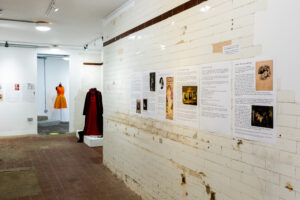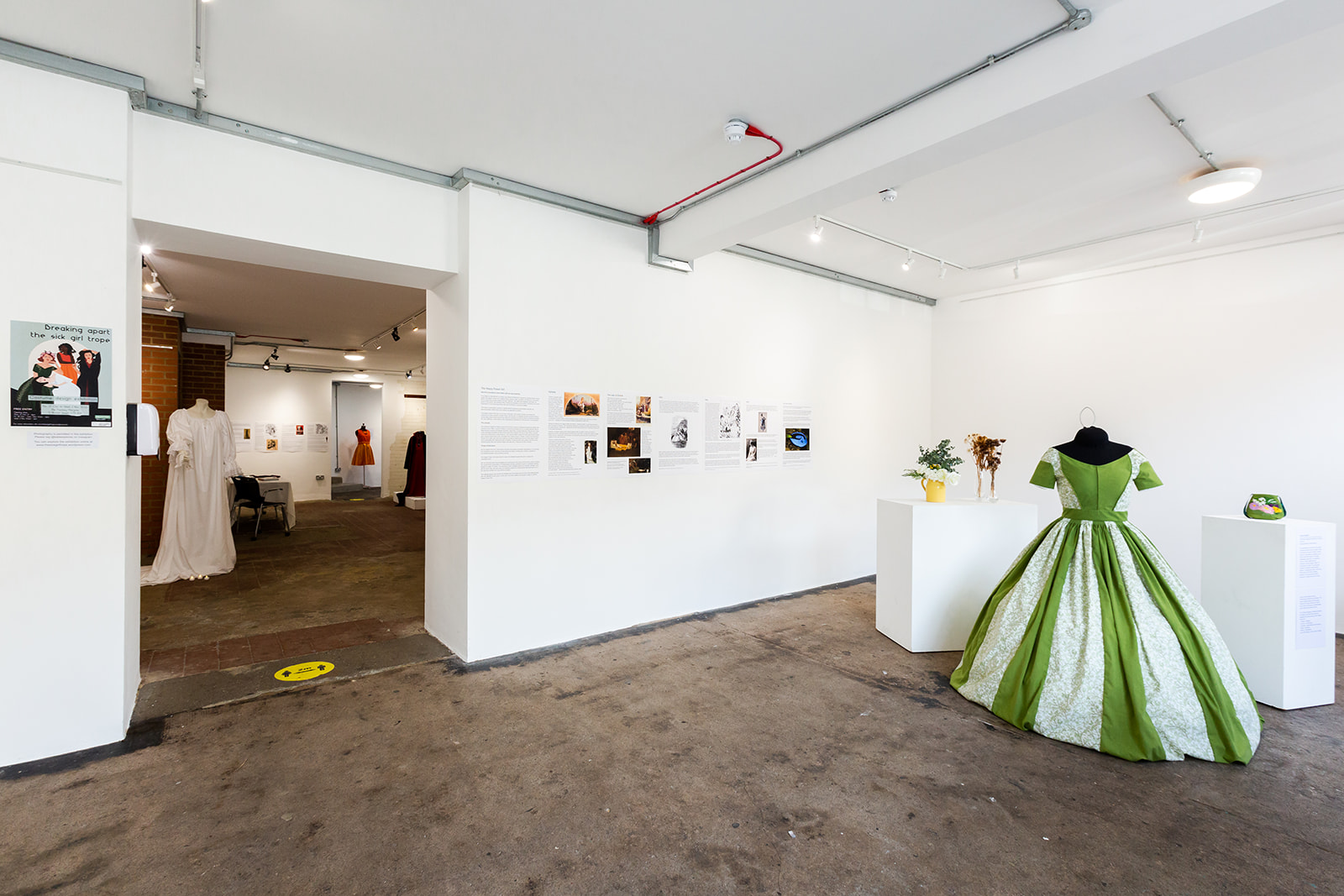
The Sick Girl Trope by Katie Hogben
 November 29th, 2022
November 29th, 2022 Nakita Cambow
Nakita Cambow Blog
Blog 0 Comments
0 Comments
My name is Katie Hogben, and I am a costume designer and producer. I have had lupus for over 11 years,  diagnosed during my undergraduate degree when I was 21. Combining my experience with the arts and chronic illness, I have just finished a very exciting project called Breaking Apart the Sick Girl Trope. Read on to find out more!
diagnosed during my undergraduate degree when I was 21. Combining my experience with the arts and chronic illness, I have just finished a very exciting project called Breaking Apart the Sick Girl Trope. Read on to find out more!
I have been very lucky with my Lupus, getting a diagnosis within a year of my symptoms coming on, having Lupus that is only considered medically to be ‘mild’, and being able to continue doing a lot of what I used to be able to do, if with some reasonable adjustments and support!
I’m a very creative person, with a particular interest in costume design and storytelling. Over the years, I’ve met a huge number of people with chronic illnesses, and what surprises me is actually how much we all have in common – particularly in regards to how the world can see us and treat us as disabled or chronically ill people.
During lockdown I spent a lot of time reflecting on my health and my experience of the world, and thought a lot on how common stereotypes about women who have a disability, chronic illness or mental health condition can be incredibly misleading, damaging and dangerous. This is when the idea for Breaking Apart the Sick Girl Trope was formed! In mid-2021 I applied for Arts Council England funding for a year-long project and exhibition, and was thrilled to win this funding.
Breaking Apart the Sick Girl Trope is a project that explores the tropes in storytelling associated with women who have a chronic illness or disability. Looking at all forms of storytelling – including novels and short stories, plays and poetry, film and television, visual art and video games – the project seeks to identify and explore through costume design common ‘sick girl’ stereotypes that are damaging or dangerous, and to present authentic alternatives.
You can explore the online version of the project’s exhibition, including photography, film, further research and links to free-to-access plays, books and other creative works here.
If you’d rather just look at photographs and watch films, explore the project’s gallery here.
The project started with a series of online creative discussion sessions, where women and non-binary people with personal experience of chronic illness or disability were invited to join to learn about the tropes, talk about their own experience and input into the project’s research to guide the final exhibition. There were over 70 interactions with this series of online discussion sessions, with participants being able to engage over Zoom by video call or typing into the chat with their camera off, over email, or over the project’s Facebook group, depending on each person’s accessibility needs and preferences.
After the online creative discussions sessions and a huge amount of research had been carried out, I then created a series of costumes that represented the damaging tropes (the Beautiful Consumptive Heroine, the Happy Flower Girl, and the Sexy Sinful Demon) and more positive representations of how we would like to see women with chronic illnesses or disabilities presented (such as badass Viking warriors, stage performers, police detectives, and fantasy heroes). The project culminated in an in-person exhibition in Margate, which had 503 visitors,
This visitor count included 45 children, including two young girls who separately audibly gasped at the ‘pretty dresses’. People who attended included local community groups, local artists, costume designers, curators and producers, people who work in disability and accessibility services, and people of different genders with their own experience of disability and chronic illness. The visitors were a wide variety of genders, nationalities, races, and ages (from a two week old newborn baby to 90+ year olds). Many locals from Thanet appreciated having something like this in our ‘little corner’ of the country, and others travelled specially from London and further afield in the country to visit this exhibition.

Myself and the gallery assistants had virtually non-stop deep conversations with visitors throughout the seven days we were open, with visitors approaching us as they neared the end of the exhibition to share their stories, ask questions, and give us their response to the exhibition and ideas for its future. Three people were reduced to tears, numerous times the gallery echoed with laughter, there was a lot of swearing and crudity at times (disabled and sick women have a great sense of humour!), and we often overheard conversations between visitors identifying themselves or friends/family in the stories and experiences presented. We had conversations with women who have experience of Lymes Disease, ME, cancer, Depression, Fibromyalgia, Thyroid problems, Anxiety, and many other conditions, as well as carers, all sharing their personal connection to the exhibition, often with great emotion and openness.
Many people who signed up to participate in the online discussion sessions and who wanted to attend the in-person exhibition were unable to do so due to being unwell due to their health conditions, however they were still able to engage through engaging with the Facebook group posts, watching the videos online, and viewing the online exhibition and photography gallery on the website.
The project’s website, which contains a huge amount of information about sick girl tropes from the project’s research, has been viewed from 6 of the 7 continents, including the countries of UK, US, Ireland, France, Italy, Brazil, Canada, New Zealand, Germany, Thailand, Netherlands, Spain and Turkey. The website had 114 views on our most-viewed day.
We have so far had over 2,400 views of the project online, across the two exhibition films, the online exhibition, the photo gallery, and the further reading and research across the website.
Some of my favourite feedback comments from the visitors are:
“As impressed by the incredible dress-making skills as by the brilliant concept. Really inspiring and through provoking exhibition.”
“Beautifully laid out and well presented information – really makes you think and realise how these tropes are in all areas of life!”
“The exhibition is one of the best things I’ve ever seen. It’s a powerful, informative, heartbreaking and inspiring journey through the different tropes. The costumes are beautiful and so thought provoking.”
“Truthfully suitable subject for the V&A.”
“Really wonderful to see such wonderful honest work about women, disability and illness – something we should never feel ashamed of. Thank you and keep up the great work.”
“Oh yes! Absobloodylutely, right on. Love the contexts and conversations.”
“Thank you so much for doing this! So accessible, so thought provoking and well communicated. And all about women! Loved it.”
I want to say a huge thank you to Arts Council England for funding this project, and to everyone who has engaged with the project and exhibition, whether in person or online. It’s been hugely uplifting having amazing conversations with those with and without disabilities and chronic illnesses, and seeing the enthusiasm so many people have for subjects like this!



 ©2024 LUPUS UK (Registered charity no. 1200671)
©2024 LUPUS UK (Registered charity no. 1200671)